The 23rd
LaureateMusic
Seiji Ozawa
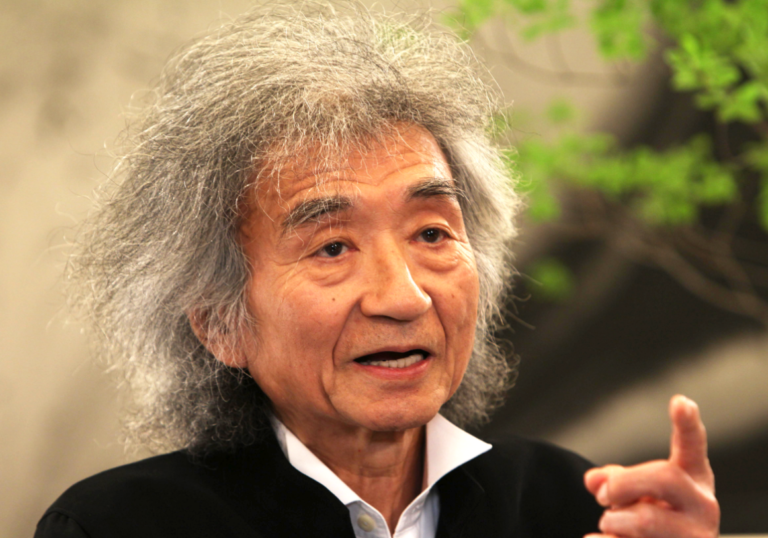
Seiji Ozawa is Japan’s most celebrated conductor and has thrilled audiences in a long and distinguished career. His repertoire ranges from the classics to late Romantic works and to the 20th century composers.
He studied conducting under Hideo Saito at the Toho School of Music in Tokyo. In 1959, aged 24 he won a prestigious international conducting prize in France and came to the attention of the world’s top conductors. He trained under Herbert von Karajan in Berlin and with Leonard Bernstein in New York.
He’s conducted the top orchestras and opera companies in the North America and Europe but is best known for his tenure as music director of the Boston Symphony Orchestra for an unprecedented 29 years starting in 1973. He built up its reputation making it one of the world’s top orchestras. In 2002, he left Boston to become music director of the Vienna State Opera for eight years.
In 1992, he fulfilled a long held dream by establishing Japan’s first international music festival, the Saito Kinen Festival Matsumoto, and supports several projects aimed at training young musicians.
Ill health has curtailed his performances since 2010, but he has plans for a number of performances this year.
Biography
Seiji Ozawa is Japan’s most celebrated conductor and has thrilled audiences the world over in a long and distinguished career. His repertoire ranges from the classics to late Romantic works and to the 20th century composers. He’s conducted the top orchestras and opera companies in the North America and Europe and is best known for his tenure as music director of the Boston Symphony Orchestra for an unprecedented 29 years.
He studied conducting under the late Hideo Saito, a central figure in the cultivation of Western music in Japan, at Toho School of Music in Tokyo. In 1959, aged 24, he went to Europe and won the first prize at the International Competition of Orchestra Conductors held in Besançon, France. In 1960, he won the Koussevitzky Prize in the US, for outstanding student conductor. He then studied under Herbert von Karajan in Berlin, and worked with Leonard Bernstein in New York, before starting a long and illustrious career in the United States.
His first professional concert performance was with the San Francisco Symphony Orchestra in 1962. Between 1964 and 1976, he conducted various orchestras including the Chicago Symphony Orchestra’s Ravinia Festival (1964-71), the Toronto Symphony Orchestra (1965-70) and the San Francisco Symphony Orchestra (1969-76). Then in 1973, he started a long and fruitful collaboration with the Boston Symphony Orchestra as its music director. During this period he helped build its reputation not only within the United States but internationally, making it one of the top orchestras in the world. In 2002, he left Boston to become music director of the Vienna State Opera for the next eight years. Also in 2002, he became the first Japanese conductor to conduct the Vienna Philharmonic’s New Year Concert. The live recording achieved phenomenal sales worldwide, selling over 1million CDs.
In 1978, when China was opening up, he was officially invited by the Chinese Government to conduct the Beijing Central Philharmonic Orchestra. The following year, building on Sino-American relations, he took the Boston Symphony Orchestra on a visit to China.
Ozawa always dreamt of building a major orchestra in his homeland and in 1984 co-founded the Saito Kinen Orchestra, and in 1992 he established the annual Saito Kinen Festival Matsumoto, in Matsumoto City, central Japan. “I believe the Saito Kinen Orchestra has the possibility to achieve the same standard as the best orchestras in the world. I’d like to see it while I’m alive.” Ozawa is also involved in training young musicians at the “Seiji Ozawa Ongaku-juku Opera Project” and at the “Seiji Ozawa International Music Academy Switzerland”.
Ill health has curtailed Ozawa’s performances since 2010, but his desire to go on performing remains undimmed. He has planned several performances for this year. Of music he says: “The worst thing for music is that one gets used to repeating the same things. For music, the sound made at each moment is important. The sounds created at each moment are everything”.
Chronology
Conducted the Vienna Philharmonic Orchestra’s New Year Concert
-
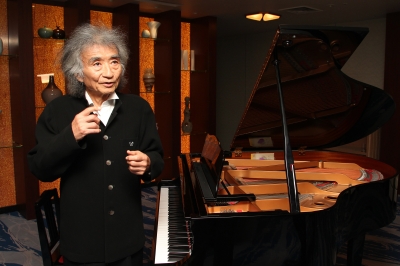
Seiji Ozawa
-
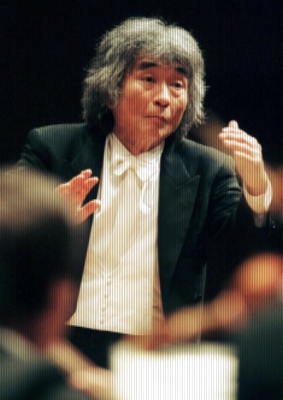
Vienna Philharmonic Orchestra
-
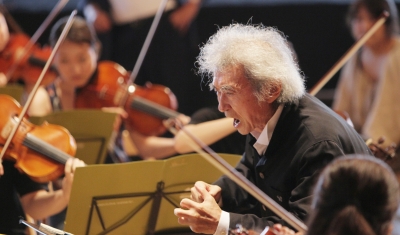
Rehearsal at Okushiga Kougen Hotel
-
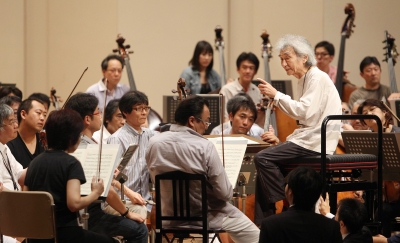
Rehearsal of “Saito Kinen Festival Matsumoto”
-
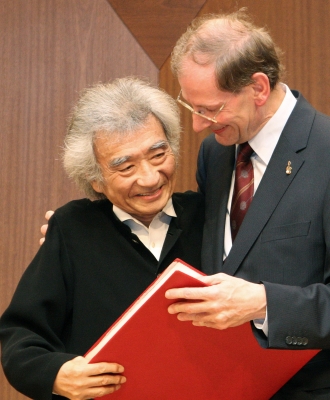
Given honorary membership of the Vienna Philharmonic Orchestra
